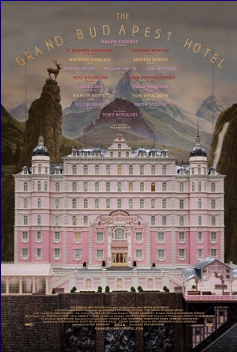How grand is The Grand Budapest Hotel? Wes Anderson's newest in the fine tradition that is Rushmore, The Royal Tenenbaums, and The Life Aquatic. For full disclosure, I am ambivalent towards Wes Anderson. I have seen Bottle Rocket and Rushmore, but stopped there. Before the hate emails come, give me a chance to explain why I stopped. I simply don't get it. There is a quietness to the humor in Wes Anderson movies, there aren't pauses in the movie to allow audiences to laugh manically. One can't laugh too long, for fear of missing critical plot points. Then there are the bright colors, and the unique editing, that makes one instinctively know you are watching a Wes Anderson movie. I'm a linear thinker, who likes segue and continuity. So abrupt changes and cue cards just aren't my thing.
Wes really challenges the audience this time in narration perspective. Let me see if I can do this justice: the movie opens in current day at a cemetery, at the grave of the writer of the book The Grand Budapest Hotel. Cut to said writer, in the 1980s telling the audience how he came to hear the Grand Budapest story. Next, we flashback to the 1960's, when the old writer (Tom Wilkinson) becomes the young writer (Jude Law) staying at the Grand Budapest. It is as the young writer that he meets the mysterious owner of the hotel, Zero, who invites him to dinner to hear his story. Are you ready for another flashback? Get ready to go further back, to the 1930s, at the start of a world war, when the owner was very young, played by the newcomer Tony Revolori, who more than holds his own against the formidable Ralph Fiennes, who plays the concierge Monsieur Gustave. Understanding this narration is helpful in determining when the end will come as it is like layers of Inception. The story of the 1930s finishes, moving to the 1960s version with the writer scribbling down notes from Zero's life, then cut to 1980s writer in his home, ending in current day at the writer's grave, full of hotel keys. I'm sure there is more symbolism in this that is over my head, and I welcome those who can enlighten me. What follows are plot spoilers, I couldn't help it for this review, so consider yourself warned.
The plot of the movie is put into full gear with the death of a loyal guest of The Grand Budapest, Madame Desgoffe-und-Taxis, an unrecognizable Tilda Swinton who really takes disappearing into a character to the next level. On the train ride to her estate for the reading of the will, some Nazi like militia asks Zero and Monsieur Gustave for their papers. Papers? Please, do they know they are talking to Amon Goeth? It is quite the role reversal for Fiennes, who is being beaten by officers, rather than giving the beating. The World War 2 movie references didn't stop there for me, for when Zero and M. Gustave reach the late M. Desgoffe-und-Taxis's estate, we see her bickering family, lead by her son Dmitri, played by Adrian Brody. In another movie, in another time, he wouldn't be so relentless in pursing M. Gustave, in the Pianist; Brody was the one being pursued. M. Gustave is pleasantly surprised to learn M. D left him a valuable painting, however her family is reluctant to let it go which prompts Gustave to steal the painting with the aid of Zero. In retaliation for stealing the painting, the family accuses Gustave of murdering M. D.
Being in prison doesn't suit Gustave, who continues to be the concierge and give everyone a kind word, it is part of his life philosophy that the most hardened criminal just needs to be loved. Well, clearly William Dafoe didn't get the message. Not only does he kill the lawyer who suspects M. D death was murder but we the audience get to see the 4 fingers the lawyer lost in the process. Then the sister of the eye witness placing Gustave at the residence the night of the death also meets a horrible end. I really don't think we need to see the severed head, and will go on record saying that I looked away.
It is quite ironic that Gustave tells Zero to always have a kind word, as from the dialogue Gustave actually has with people, it is clear he is a pragmatist; he sees the world for the horrible place it can be. During Gustave's prison escape, in which he and his bunk mates Shawshanked their way out, one team member was lost while killing off the prison guards. To which Gustave calmly replies "that's a draw." I laughed at this, I realize it might be deemed inappropriate but I feel it was what Wes was going for.
A draw? Really? Looks like half a dozen guards were taken out by one guy, which is hardly a draw.
Gustave was expecting something to be left to him in the will. He wouldn't have made the trip if he didn't think it would be worthwhile, now would he? A few krona as it were, but "one never knows until the ink dries" How true Gustave, how true. And when the ink dries on this movie, how will it stack up in the Wes Anderson cannon? Currently it is 91-92% on Rotten Tomatoes. And to emphasize, this isn't my cup of tea, although I did stay awake through all of it (not all indies get that vaulted treatment) So there is that, but I will leave it to the Wes Anderson fans to determine the greatness of the Grand Budapest Hotel, I fear I am not qualified to pass such judgment.








